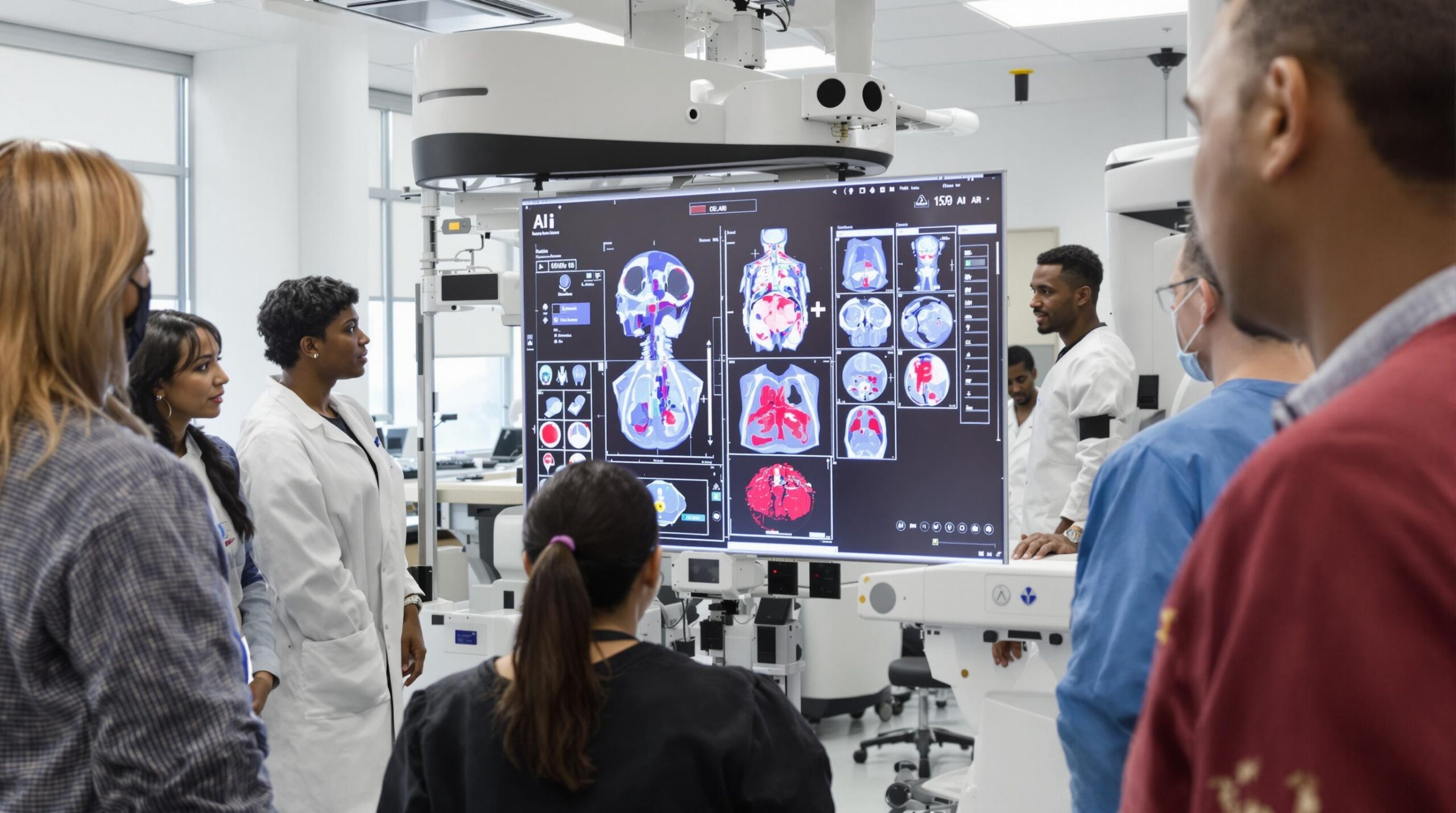Artificial Intelligence (AI) has rapidly transformed the field of medical diagnostics, changing how healthcare professionals detect and treat diseases. AI-driven systems can analyze vast amounts of medical data with incredible speed and accuracy. These advancements improve patient outcomes while reducing the burden on clinicians and laboratories. Enhanced diagnostic tools supported by AI enable early detection and personalized care solutions for patients worldwide.
AI-Powered Imaging and Radiology
AI algorithms now play a crucial role in reading medical images such as X-rays, MRIs, and CT scans. Deep learning models can identify subtle patterns in these images that may escape even the most experienced radiologists. These systems interpret images faster and more accurately than traditional manual analysis. Radiologists now use AI-powered tools to confirm or rule out diagnoses, leading to faster treatment decisions.
For example, AI applications can detect lung cancer nodules or areas affected by stroke much earlier than before. Early detection is critical, as it often leads to better prognosis and improved survival rates. AI also decreases the number of overlooked anomalies by reducing observer fatigue and human error. As a result, these advancements enhance patient safety and trust in diagnostic results.
Machine Learning in Pathology
Pathology departments have integrated AI and machine learning tools to analyze tissue samples and cell images. These systems can quickly assess thousands of slides to identify signs of disease, such as cancer or infection. Machine learning models uncover hidden patterns and subtle differences that may not be visible to the human eye. As a result, pathology labs are now able to handle larger workloads and deliver faster results.
Combining AI with digital pathology reduces diagnostic errors and inconsistencies between different clinicians. With standardized, AI-powered analysis, test results become more reliable across diverse healthcare settings. This revolution ensures patients receive the right treatments in less time. Additionally, AI assists pathologists by prioritizing critical cases, so urgent diagnoses can be addressed without delay.
AI-Enhanced Laboratory Testing
Laboratory medicine faces increased pressure to produce precise results quickly and cost-effectively. AI tools facilitate rapid processing of massive datasets, such as genetic sequencing or blood panel results. Algorithms predict the likelihood of certain conditions, offering prescriptive recommendations for further testing or intervention. Automated analysis reduces turnaround time for laboratory reports and minimizes the risk of mislabeled or misplaced samples.
Laboratories can now adopt robotic systems integrated with AI for tasks such as sample sorting and result interpretation. AI-driven systems flag unusual or critical results immediately, allowing healthcare professionals to intervene sooner. This technology also ensures quality control and reproducibility across complex laboratory processes. As a result, patients benefit from timely, dependable laboratory diagnostics that guide their treatment plans.
AI and Predictive Analytics
Predictive analytics powered by AI is transforming preventive medicine and risk assessment. Machine learning platforms analyze patterns in electronic health records, lifestyle data, and genetic information to calculate a patient’s risk for various diseases. These platforms can flag early warning signs of conditions such as heart disease, diabetes, and certain cancers. This approach allows clinicians to conduct targeted screenings and develop proactive care strategies.
Hospitals and clinics increasingly rely on AI to optimize resource allocation and patient management. Predictive tools help healthcare providers identify high-risk patients who may require more frequent monitoring. Automation of these processes enables more efficient use of medical staff and equipment. Using AI, institutions can prevent unnecessary hospitalizations and improve patient outcomes while lowering healthcare costs.
Personalized Medicine and Treatment Planning
AI advancements enable a shift toward personalized medicine, where diagnostic and treatment plans are tailored to individual patients. Algorithms analyze genetic profiles, lifestyle habits, and clinical histories to recommend targeted therapies. This process increases the effectiveness of treatments and minimizes potential side effects. Patients receive care specifically suited to their unique biological makeup and health risks.
AI-driven decision support tools assist doctors in selecting the best treatment based on objective data and latest clinical guidelines. These tools continuously update their recommendations as new medical data becomes available. As a result, patients benefit from cutting-edge therapies that reflect the most current scientific knowledge. This evolution enhances both safety and satisfaction in patient care.
Challenges and Ethical Considerations
Despite these remarkable advancements, integrating AI into medical diagnostics raises several challenges. Data privacy and security remain primary concerns, as sensitive medical information is stored and processed by AI systems. Healthcare institutions must implement rigorous protocols to safeguard against unauthorized data access and breaches. Ethical questions also arise regarding accountability for diagnostic errors made by automated systems.
Addressing bias in AI algorithms is crucial for ensuring fair and accurate diagnostics across diverse patient populations. AI developers must regularly test and retrain models with varied datasets to prevent disparities in care. Regulators and healthcare professionals collaborate to create guidelines for safe and effective AI adoption. Transparent oversight ensures accountability as technology becomes more integrated with patient care.
The Future of AI in Medical Diagnostics
The impact of AI technology on medical diagnostics continues to expand. Researchers are developing new algorithms that can identify complex disease patterns and rare conditions faster than ever before. Integration of AI with wearable health devices and remote monitoring platforms empowers patients to take a proactive role in managing their health. AI will also enhance collaboration between medical professionals, uniting experts across disciplines and geographic locations.
Ongoing education and training for healthcare providers will be essential as AI-powered systems become standard tools in clinical practice. Institutions must adapt their workflows to include AI technologies while maintaining human oversight and expertise. Investment in secure infrastructure, robust data management, and ethical guidelines will support sustainable, long-term growth. Ultimately, AI’s potential to revolutionize medical diagnostics will continue to drive remarkable improvements in healthcare worldwide.

